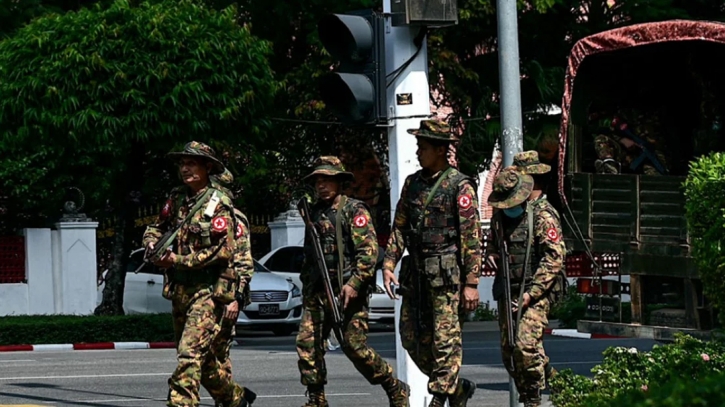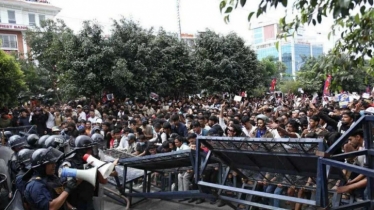
Myanmar's military government has introduced mandatory military service for all young men and women as it struggles to contain an anti-junta insurgency in various parts of the country.
All men aged 18 to 35 and women aged 18 to 27 will have to serve for up to two years, while specialists such as doctors aged up to 45 can be called on for up to three years, state media reported over the weekend.
On Tuesday, the military said the compulsory service would begin in April. The army's information office said in a statement that 5,000 people each month would be called up and given training, The Associated Press reported.
Even though a law mandating conscription was introduced in 2010, it had not been enforced until now. Evading conscription is punishable by three to five years in jail.
‘Coercive recruitment methods’
Ye Myo Hein, a fellow at the Washington-based Wilson Center, told DW that the military has resorted to this measure as there aren't many young people voluntarily joining the service.
"With increasing public animosity towards the military following the 2021 coup, voluntary enlistment has become virtually impossible. Consequently, the military is left with no choice but to resort to forced and coercive recruitment methods," he said.
He voiced skepticism about the new policy, arguing that it could have a detrimental impact on the military.
"I believe that forced recruitment, even if successful, will not alter the wider context of the conflict or enhance the fighting capabilities of the military," he said.
"In fact, undisciplined, ill-trained, and demoralized new recruits may inadvertently have a negative impact," he added, "further diminishing the already-reduced capacities of the military."
Coup sparks conflict
Myanmar, which has long been known for instability and domestic insurgencies, has been in chaos ever since the military, led by General Min Aung Hlaing, overthrew the democratically elected government on February 1, 2021.
The coup sparked an armed conflict between the military, on one side, and the civilian-led National Unity Government (NUG), pro-democracy fighters called the People's Defense Forces (PDF) and ethnic armed groups, on the other.
An alliance of three different ethnic-minority insurgent groups and PDF fighters recruited since the coup joined forces last year.
In October, they launched a coordinated offensive against the Tatmadaw, as the military is known, inflicting heavy personnel and territorial losses.
They have also captured dozens of townships and hundreds of army bases. Three years after seizing control, the junta is now still struggling to control the country. According to the NUG, over 60% of Myanmar's territory is under the control of resistance forces.
Junta's diminished grip
Forced conscription shows the junta's weakness, Justine Chambers, a Myanmar researcher and anthropologist at the Danish Institute for International Studies, told DW.
"I think it's a reflection of just how weak the military is," Chambers said. "The fact that they're so desperate: In 60 years of different military dictatorships, this is the first time they've used this rule, this law."
Chambers said conscription had already started in Myanmar's impoverished regions.
"We already know that, in some particularly poor areas and the informal settlements, they've been doing sort of random, forced conscription, grabbing young guys off the street, and recalling retired soldiers," Chambers said.
"Those who will be forced into the military will be poor people, those who don't have access to opportunities," she added. "The military will be cracking down on checkpoints, which's also a way for them to just restrict the movement of people."
A big blow
The conscription law is the latest in a series of major blows for the young people of Myanmar in recent years, alongside the coronavirus pandemic and the military coup.
"The young people have suffered a lot in terms of education, opportunities, aspirations," Chambers said. "This is like another nail in the coffin."
The economy has taken a huge hit, with foreign investment drying up since the coup and Western sanctions taking hold.
Power outages, frequent supply shocks of key commodities including fuel and skyrocketing prices are hitting the general public hard.
Total economic output is now about 10% lower than what it was in 2019, before the pandemic, and there is little hope of recovery in 2024, according to a report by the World Bank. The conscription law's activation now has created fear and anxiety among many.
"Public sentiment against this conscription law is evident on social media and in public response. Even pro-military supporters will be reluctant to consider joining the military in the current situation," Ye Myo Hein said.
"While there may be a need for jobs due to a higher unemployment rate after the coup, people are well aware that joining the military is essentially signing up for a likely death sentence," he added.
"The conscription law sends a clear message to the entire country that nobody, not even those living in major cities with relatively comfortable lives compared to those in war zones, will possibly escape the sufferings inflicted by the military junta and the consequences of the military coup," he said.





































